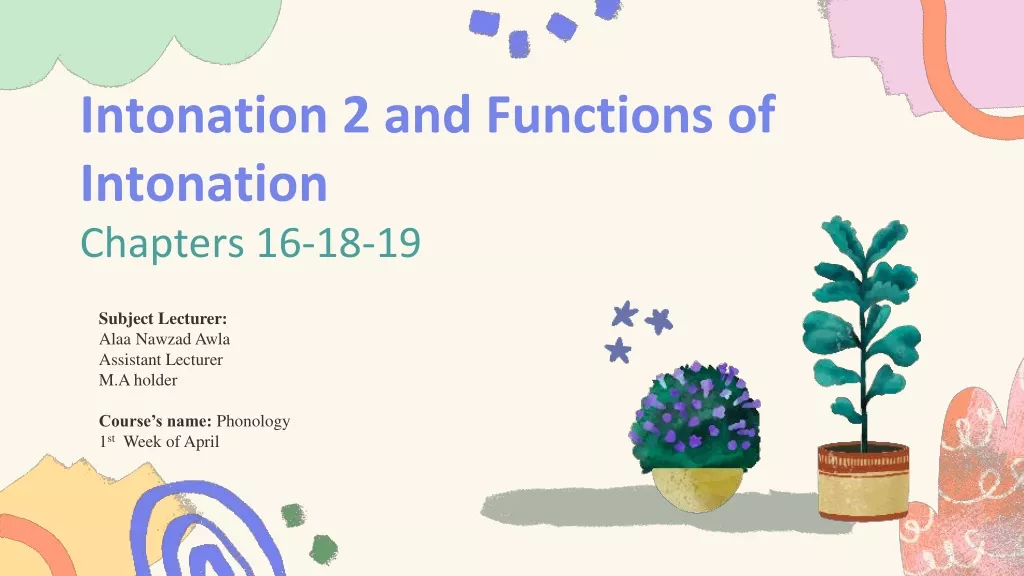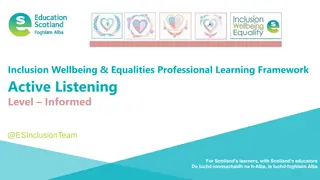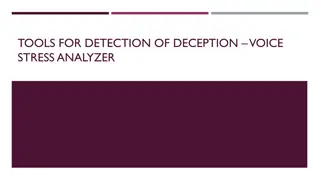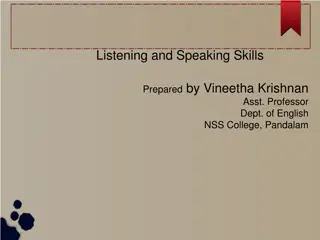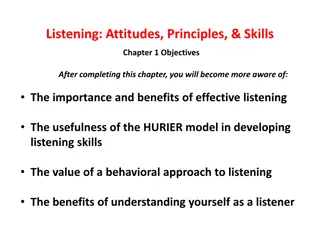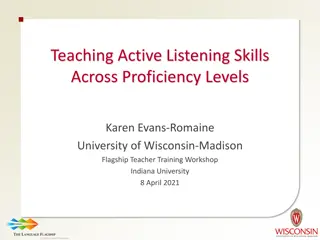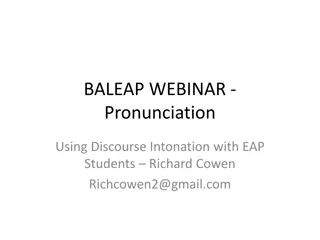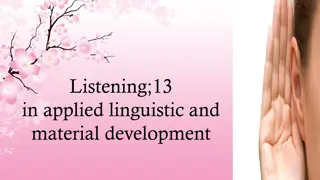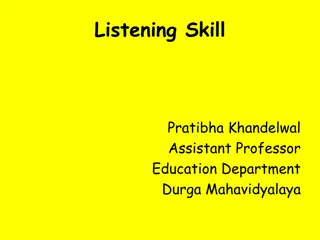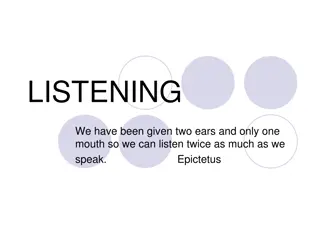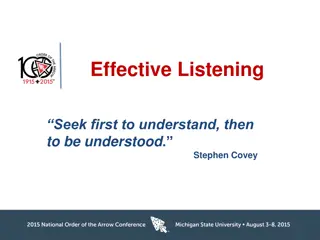Enhancing Listening Skills Through Stress, Intonation, and Pausing
Explores the impact of stress, intonation, and pausing on improving listening skills among EAP students. Students reported increased confidence, transfer of strategies, and enhanced control in listening activities. Specific activities focused on SIP showed significant benefits, making listening practice more beneficial, enjoyable, and accessible.
Download Presentation

Please find below an Image/Link to download the presentation.
The content on the website is provided AS IS for your information and personal use only. It may not be sold, licensed, or shared on other websites without obtaining consent from the author. Download presentation by click this link. If you encounter any issues during the download, it is possible that the publisher has removed the file from their server.
E N D
Presentation Transcript
SIP and Listen IMPROVING LISTENING SKILLS THROUGH A FOCUS ON STRESS, INTONATION AND PAUSING PENNY PODIMATOPOULOS UOW COLLEGE, AUSTRALIA
SIP and Listen Knowing SIP makes us more confident listeners. Pausing helps us understand key words and gives us time to think. One sentence can have different meaning. It s not just about knowing the vocab. Intonation can help with meaning and so we have become good listeners, said the students.
SIP and Listen Action Research Question How does raising students * awareness of SIP affect their listening skills? * Students in the project: pre-intermediate EAP students
SIP and Listen Action Research: How? At least one specific SIP-focused activity practised in class every day for 6 weeks Regular surveys to gauge students perceptions of their listening ability Surveys and interviews conducted at the end of each 6- week cycle to gauge students perceptions of their listening ability
SIP and Listen Action Research Results Students reported: a greater level of confidence in their listening ability a transfer of the strategies practised in the specific activities to other general listening activities a greater sense of control in listening due to less dependence on understanding vocabulary and grammar
SIP and Listen Activites chosen for today s workshop are ones the students reported to be: Beneficial Enjoyable Simple accessible Tools for better listening
SIP: Jumbled Thought Groups Read out/listen to/write each thought group by number 2. Silently, individually read completed list, mark punctuation 3. Listen to text read by teacher, check punctuation, mark SIP 4. Read as a class with teacher, some drilling 5. Read aloud in pairs 1.
SIP for meaning 1. The university is now smoke-free so please respect this. 2. Most Australians grow up only 30 minutes from the beach. 3. It hasn t rained for about 4 months. 4. The trains to Sydney will be off all weekend. 5. The plane was 4 hours late. 6. It s very important that you do your homework.
SIP for Meaning: Steps 1-5 Listen to 1 statement pronounced with different SIP: Statement, statement with Emphasis, Questioning statement 2. Elicit, discuss differences 3. Drill each variety of SIP; write SIP on board, name each statement 4. Listen to range of statements and identify pron: S/E/Q 5. Check in pairs, discuss differences, check; listen again, drill 1.
SIP for Meaning: Steps 6-8 6. Read statements in pairs choosing SIP for S/E/Q; partner identifies S/E/ or Q 7. Discuss any differences, teacher monitors, drill as required 8. Follow-up with an authentic listening to identify S/E/Q
Listen and Mark SIP Listen without seeing the text 1. 2. Listen again, read text and mark P only 3. Repeat listening to mark SI 4. Discuss in pairs 5. Listen again, compare in pairs, amend as required 6. Read in pairs, mark punctuation 7. Listen, read aloud with recording
SIP and Listen: pennypod@uow.edu.au Knowing SIP makes us more confident listeners. Pausing helps us understand key words and gives us time to think. One sentence can have different meaning. It s not just about knowing the vocab. Intonation can help with meaning and so we have become good listeners, said the students.
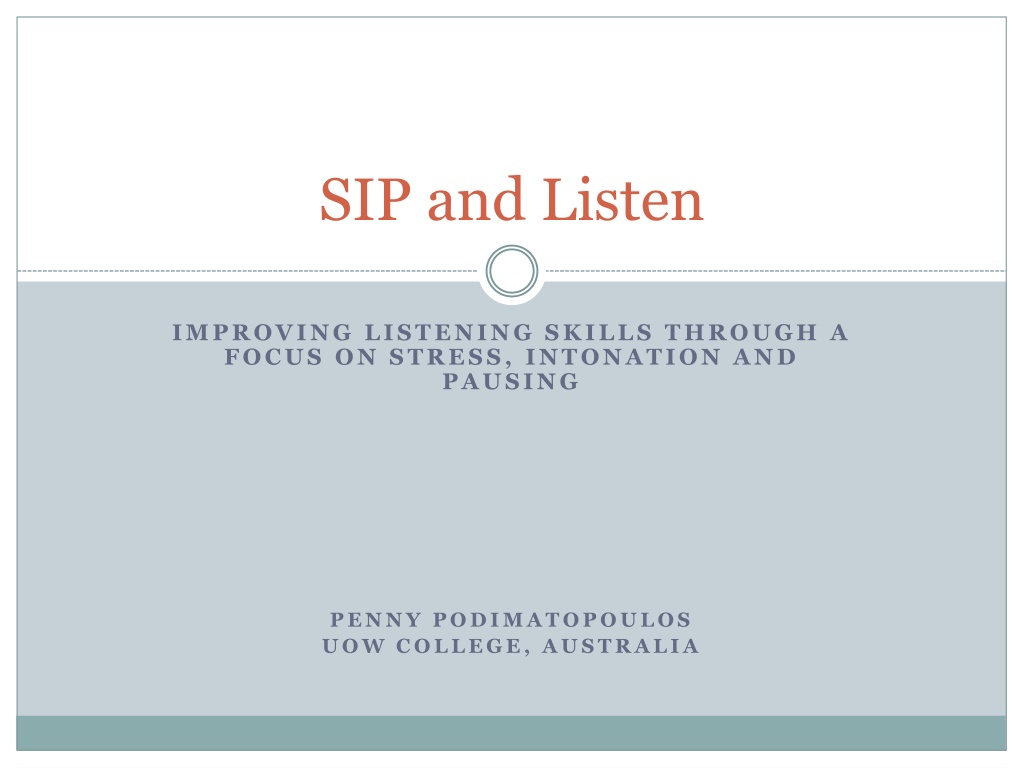
 undefined
undefined









